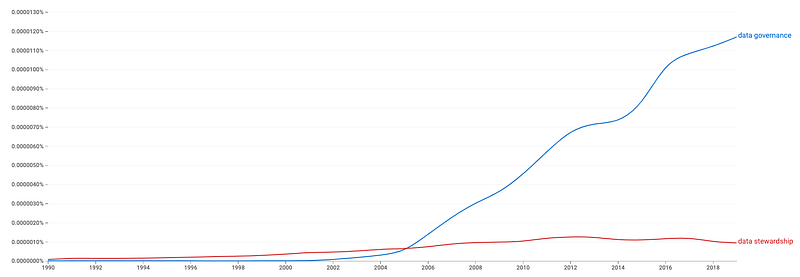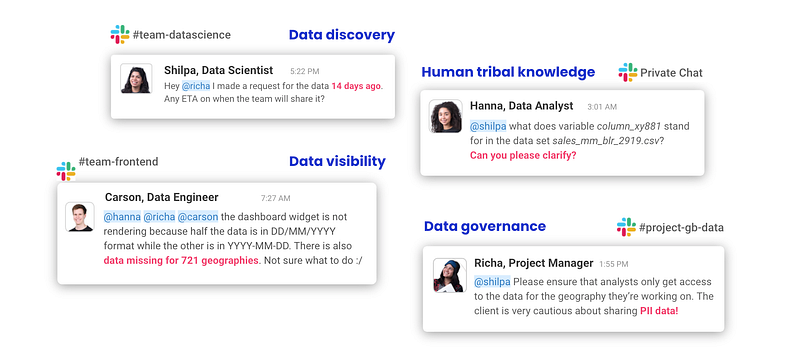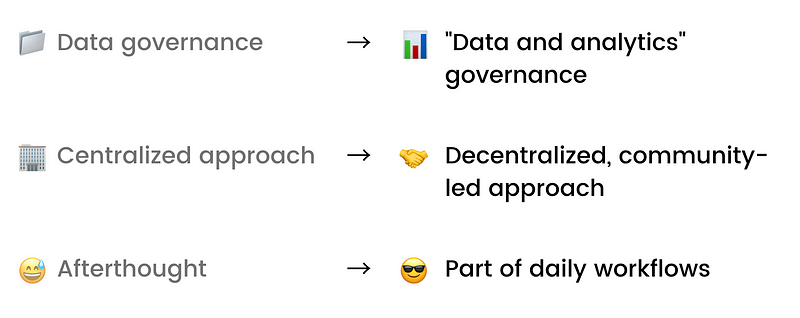[ad_1]
The story of the place knowledge governance began and the way all the things went mistaken
Of all of the duties that I’ve achieved within the knowledge business, knowledge governance has truthfully been my least favourite.
Laura B. Madsen, Disrupting Information Governance
Whenever you hear the phrase “knowledge governance”, what’s the very first thing you suppose? Guidelines or insurance policies? Processes or administration? Management?
Information governance is seen as a restrictive, bureaucratic, controlling course of — a set of restrictions dropped down from on excessive to decelerate your work. And the truth is, that’s typically the way it really works inside organizations.
As somebody who works in knowledge governance, this makes me a bit unhappy. Governance shouldn’t be one thing that the people of information should concern. At its coronary heart, knowledge governance isn’t about management. It’s about serving to knowledge groups work higher collectively.
So let’s break down why knowledge governance is having an id disaster, what it was really envisioned as a long time in the past, and the way we will save the reputations of information stewards all over the place.
The place did knowledge governance come from?
Information governance was constructed on actually cool ideas. However should you seek for the historical past of information governance, you in all probability received’t get very far. There aren’t actually any suppose items tracing it again to some ridiculously early time (suppose knowledge’s roots in 20,000-year-old bones or the census’ origin in historical Egypt).
A part of the reason being that, nicely, knowledge governance isn’t attractive. Few folks can stifle their yawns lengthy sufficient to delve into its current, not to mention its previous. To make issues harder, knowledge governance got here out of information stewardship, a phrase that sounds much more dense and technical.

Although “knowledge governance” took off within the mid-2000s, the concept of taming and defending knowledge (aka “knowledge stewardship”) has been round since knowledge blew up a decade earlier.
Information stewardship happened to attach the techie world of information with the non-techie world of enterprise. As Laura Madsen wrote, “Information stewards had been meant to assist solidify the squishy… They converse the language of IT and translate that again to the enterprise. The position requires the persistence of a kindergarten instructor and the flexibility to efficiently negotiate a hostage scenario.”
At its core, knowledge stewardship, and later governance, was all about collaboration and democratization. Information stewards acted as a bridge between folks and course of. They deftly navigated firms by the problems that come up with utilizing knowledge, and introduced readability and order to the intimidating new world of huge knowledge.
Information governance right now: management, not collaboration
Although knowledge governance grew out of this concept of collaboration, it’s hardly ever been applied in that manner. In the present day, it’s seen extra as a method to impose management.
Information governance initiatives are normally framed round safety and danger — we now have to control our knowledge to lower our danger.
It’s no surprise that firms concern knowledge dangers. As knowledge has grown, the principles and expectations round it have skyrocketed. With fixed information about privateness breaches, persons are changing into extra attentive to how their private knowledge is protected. In 2018, there was a “world counting on knowledge governance”, because of a number of large knowledge breaches that destroyed the credibility and inventory values of manufacturers like Equifax, Fb, Marriott, and Yahoo. Consequently, new knowledge compliance necessities (e.g. GDPR and CCPA) are popping up day-after-day.
In the present day, firms need to lower the chance of displaying confidential knowledge to the mistaken individual, dangerous knowledge getting used to make huge choices, and violating essential rules. To stop these missteps, knowledge is surrounded by complicated safety processes and restrictions, all dictated by a distant knowledge governance crew.
Extra knowledge governance, extra agility?
Through the years, knowledge governance has misplaced its id. We concern it, however we must be celebrating it — as a result of basically it’s about creating higher knowledge groups, not controlling them.
Actually, the extra folks begin trusting knowledge governance, the extra they’ll really be capable of obtain. Sounds iffy? Let’s begin with an instance.
At Atlan, we began out as an information crew ourselves. Again then we didn’t know what knowledge governance was. We simply knew that we wished to tackle large “knowledge for good” tasks, like making a SDG monitoring platform for the United Nations or opening 10,000 new clear gasoline distribution facilities.
The issue was, day-after-day was chaos. We had collaboration overload, the place folks spent extra time making an attempt to entry or perceive the information than really utilizing it. Our Slack was stuffed with messages like “Why is knowledge lacking for 721 geographies?” or “Why are these dashboards displaying completely different numbers?”

So we labored to repair these points, constructing inner knowledge instruments and higher processes for collaboration. Quickly sufficient, we realized that we had been carrying out tasks twice as quick with groups that had been one-third our regular dimension. We even constructed India’s nationwide knowledge platform, achieved by an 8-member crew in simply 12 months. We by no means would have been ready to do that with out the best tooling and cultural practices governing our crew and knowledge.
I feel that the extra that organizations begin believing in and investing in — reasonably than dreading — true knowledge governance, the extra they’ll be capable of obtain. This implies implementing governance instruments and processes which are agile and collaborative, reasonably than a top-down governance crew someplace saying, “Right here’s how it’s worthwhile to take into consideration definitions”.
The information governance renaissance within the fashionable knowledge stack
In his weblog in regards to the fashionable knowledge stack, Tristan talked about knowledge governance lagging behind the remainder of the trendy knowledge stack. He wrote, “Governance is a product space whose time has come… With out good governance, extra knowledge == extra chaos == much less belief.”
I feel his phrases echo the broader sentiment of information groups and practitioners within the fashionable knowledge stack. As knowledge groups develop into extra mainstream, and the trendy knowledge stack has made it simpler to ingest and remodel knowledge, the shortage of information governance practices is among the prime obstacles stopping knowledge groups from being agile and driving affect.
This has introduced us to a second of redemption for knowledge governance. For the primary time, the necessity for governance is being felt bottom-up by practitioners, as an alternative of being enforced top-down as a result of regulation.
This bottom-up adoption is a chance for us to lastly get knowledge governance proper. Nevertheless, fashionable knowledge governance for the trendy knowledge stack will look very completely different from its predecessor — and because of this we’ll have to alter the way in which we method knowledge governance implementations.
The paradigm shift that knowledge governance wants right now

From knowledge governance to “knowledge and analytics” governance
“Information” isn’t the one asset that must be ruled anymore.
We’re shifting to an ecosystem the place knowledge property are extra than simply tables — they’re additionally dashboards, codes, fashions, and extra. All these property want holistic types of governance.
From a centralized method to a decentralized, community-led method
Centralized knowledge steward–primarily based, top-down governance fashions received’t work anymore.
The office is altering. High-down cultures are getting eroded and workers crave objective in all the things they do, so simply telling folks to do one thing received’t work anymore. The information governance of the longer term must be basically practitioner-led.
I virtually consider this as an information group, reasonably than knowledge governance, the place practitioners really feel an obligation to create reusable property in order that they may also help different group members.
From an afterthought to part of every day workflows
Up to now decade, knowledge governance was all the time utilized as an afterthought. Information practitioners would ship tasks as they had been, then return later and add knowledge governance necessities dictated by top-down mandates.
Within the new world, knowledge governance received’t be an afterthought. As a substitute, will probably be a typical that’s an integral a part of the “delivery workflows” for knowledge practitioners.
Let’s rebrand knowledge governance
The trendy knowledge stack is a grasp in rebranding new classes. Up to now yr alone, we’ve created Headless BI, Reverse ETL, Information Observability, and plenty of extra areas. The motion that has fascinated me most is “analytics engineering”, which modified the concept of information cleansing and transformation and gave an entire group of individuals the next objective.
I’ve an ask of our group… Let’s lastly rebrand knowledge governance and provides it the rightful place and respect it deserves in our stacks. Let’s make it sound like what it’s meant to be — a set of practices that tremendous knowledge groups will observe.
I don’t fairly know what the brand new model and title for contemporary knowledge governance must be, nevertheless it must align with the basic reorientation of governance as a bottom-up, community-led, practitioner motion.
Possibly it must be referred to as Information Enablement, Neighborhood-Led Information Governance, or the Information-Product Mindset? Possibly the Information Steward position must be subsumed within the Information Product Supervisor position? Possibly Information Governance Managers must be rebranded as Information Neighborhood Managers or Information Enablement Managers and be a part of the broader knowledge platform groups?
There’s a lot chance, so I’d love to listen to from extra folks. What do you suppose?
This text was initially revealed on In the direction of Information Science.
Header photograph: Dimitry Anikin on Unsplash
[ad_2]

